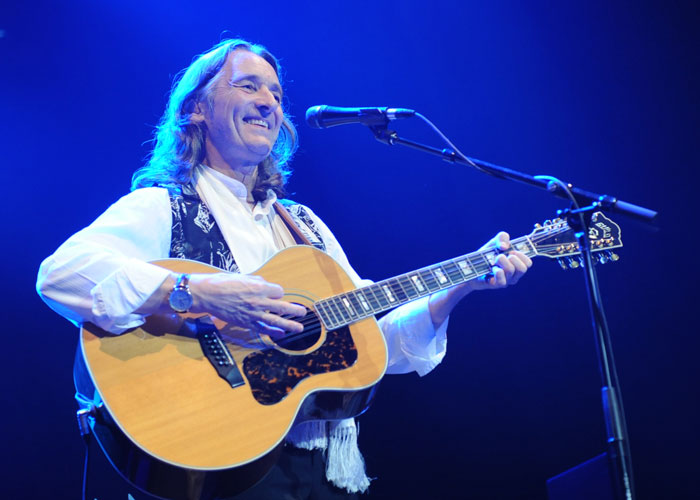|
Roger Hodgson says playing Supertramp hits at Sands Bethlehem Event Center is 'greatest gift I can give'
John J. Moser,
THE MORNING CALL
Music artists are, by their very definition, a
creative bunch, so there seems to be an expectation that new music
is always being written and on the way. But what if an artist has songs to which fans have
connected for 40 years – ones that were its breakthroughs or were on
a four-times-platinum album and are still beloved by old fans and
being discovered by new ones?/p>
And what if those songs are the ones with which you
connect most, as well? That’s the position Roger Hodgson, the iconic voice of 1970s progressive-rock-and-pop band Supertramp and writer of its biggest songs, says he finds himself in today, as he heads out on a tour that brings him to Sands Bethlehem Event Center on Sunday, Nov. 9.
“But life is such that, when there’s hundreds of
thousands of fans wanting a new album, maybe I’ll do something,”
Hodgson says. “But people want to hear the old songs that they have
a relationship with, and that’s the greatest gift I can give them.” This tour recognizes the 40th anniversary of the 1974 release of Supertramp’s “Crime of the Century” album, which became its first disc to chart in America (it peaked at No. 38 and went gold), and gave the band its first hit, “Dreamer.”
After leaving Supertramp, Hodson released three solo
albums – none of which performed nearly as well as the Supertramp
discs did. In fact, Hodgson says he plays a couple of songs from his
most recent solo disc, 2000’s “Open The Door,” which, “to tell you
the truth [people at the shows] haven’t heard.”
“Most people haven’t heard it – it’s still a great
album,” Hodgson says. “It’s like hearing new songs, and there are
some great songs on that album. I play a song called ‘Death
and a Zoo,’ and often that steals the show,” he says. “It’s
interesting – I love it when I play something new and that’s the one
people talk about after the show.”
He says he didn’t just write about topics such as
“Puppy Love.”
“I expressed everything – from my question, my deep
inner questions, to my joy, my pain, you name it. It’s all in there
– my longing to know God. So a lot of these songs really struck a
nerve with a lot of people. Because I’m a people,” he says,
laughing.
“And all I’m doing is expressing what’s in my heart,
and going on in my life and in my life experience. And a lot of
people who don’t have that ability to do express themselves in music
or in any other way found solace in the fact that, here was someone
who felt the same way they did.”
He says he gets letters from people saying, “ ’Boy,
your music … even saved my life.’ Or, ‘I was totally depressed and
then this one song really pulled me out of it’, or ‘I had a breakup
with my girlfriend.’ I know, for me, going through my hard times, I
know music has really helped me to get through it.”
He said he’s especially surprised that songs such as “Hide
in Your Shell,”
“Lord
Is It Mine” and “Even
in the Quietest Moments,” none of which was a hit, are his most-
requested songs because of the way they’ve touched fans.
He says that after all the years, he has “a greater
appreciation” for the old songs, but people have told him the songs
actually mean more to them now than when they first heard them. “As
teenagers, they didn’t, maybe, understand the songs, but now as they
go back and listen to them later on in life they have a much deeper
meaning,” he says. “That has happened to a lot of people.”
Hodgson says he is able to still able to enjoy
playing the songs because “they do just have an evergreen quality –
timeless quality.”
“For me, the recordings feel old, but the songs
don’t,” he says. “When I sing the songs live today, they don’t feel
like 30-year-old songs. They feel like current, very relevant songs.
And I can only attribute that to the fact that they really did come
from a really pure place in me when I wrote them.
“They weren’t contrived—they really were kind of
songs from my heart and soul, and maybe that’s why they’re timeless.
… The ones that were really inspired –which is most of them,
actually.
Hodgson says he didn’t have much input into the
re-release of “Crime of the Century” other than to contribute an
interview to the liner notes, as did Supertramp’s other members. “I
wasn’t involved in the actual packaging, no,” he says. “That’s
mainly the record company.”
Asked whether he had any contact with keyboardist
and co-writer/vocalist Rick Davies, Hodgson simply says he does
not. Davies in recent years has revived the Supertramp named and
toured without Hodgson. There apparently are no thoughts of a
reunion.
“For me, connecting to people through the music I’ve written and a few new songs is what I’m doing right now,” Hodson says. “And that’s just what I’m being called to do, rather than spend four, five, six months in a studio making an album.
Click here for the original article:
mcall.com |

